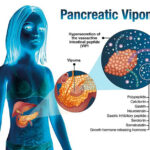What is Diarrhea?
Diarrhea is a condition characterized by the frequent passage of loose or watery stools, often occurring more than three times a day. It can be acute, lasting for a few days, or chronic, persisting for weeks. While mild cases resolve on their own, severe diarrhea can lead to dehydration and other health complications.

Causes of Diarrhea
Diarrhea can result from various factors, broadly classified into infectious and non-infectious causes.
1. Infectious Causes
- Viral Infections – Rotavirus, norovirus, and adenovirus are common culprits of viral gastroenteritis, often causing sudden onset diarrhea.
- Bacterial Infections – Bacteria such as Escherichia coli, Salmonella, Shigella, and Campylobacter are frequent causes of foodborne illnesses.
- Parasitic Infections – Parasites like Giardia lamblia and Entamoeba histolytica cause prolonged diarrhea, often through contaminated food and water.
2. Non-Infectious Causes
- Food Intolerances – Lactose intolerance and gluten sensitivity can trigger diarrhea upon consuming dairy or wheat products.
- Medications – Antibiotics disrupt gut microbiota, sometimes leading to diarrhea. Other drugs, such as laxatives, also have a diarrheal effect.
- Chronic Digestive Disorders – Conditions like irritable bowel syndrome (IBS), inflammatory bowel disease (IBD), and celiac disease contribute to chronic diarrhea.
Symptoms of Diarrhea
Diarrhea presents with a range of symptoms, varying in severity based on its underlying cause:
- Frequent, loose, or watery stools
- Abdominal cramps and bloating
- Nausea and vomiting
- Fever and chills
- Dehydration (dry mouth, dizziness, dark urine, reduced urination)
Severe diarrhea can lead to electrolyte imbalances and dehydration, requiring urgent medical attention.
How is Diarrhea Treated?
1. Hydration Therapy
Replenishing lost fluids and electrolytes is the cornerstone of diarrhea management.
- Oral Rehydration Solutions (ORS) – A mixture of salts, glucose, and water to prevent dehydration.
- Intravenous Fluids (IVF) – Used in severe cases, especially for infants, elderly, or individuals with extreme dehydration.
2. Medications
- Antidiarrheal Drugs – Loperamide (Imodium) reduces stool frequency but should be avoided in infectious diarrhea.
- Probiotics – Help restore gut microbiota balance, particularly after antibiotic use.
- Antibiotics – Only used if bacterial infection is confirmed, as they are ineffective against viral diarrhea.
3. Dietary Modifications
- BRAT Diet – Bananas, rice, applesauce, and toast can help firm up stools.
- Avoid Dairy & Fatty Foods – These can worsen symptoms, especially in individuals with lactose intolerance.
- Increase Fluid Intake – Clear broths, coconut water, and herbal teas aid in recovery.
Preventing Diarrhea
1. Practicing Good Hygiene
- Wash hands thoroughly with soap, especially after using the restroom and before eating.
- Use hand sanitizers when soap and water are unavailable.
2. Safe Food and Water Practices
- Drink filtered or boiled water, especially in areas with poor sanitation.
- Avoid raw or undercooked foods that may harbor harmful bacteria.
- Store food properly to prevent contamination.
3. Vaccination
- Rotavirus vaccination is highly effective in preventing severe diarrhea in children.
Diarrhea Complications and When to Seek Medical Help
While most cases of diarrhea resolve on their own, severe cases can lead to complications such as:
- Severe dehydration
- Electrolyte imbalances
- Malnutrition (especially in chronic diarrhea cases)
Seek medical help if:
✔ Diarrhea persists for more than three days.
✔ There is blood or mucus in the stool.
✔ High fever and severe abdominal pain occur.
✔ Signs of dehydration appear (dizziness, dark urine, extreme thirst).

